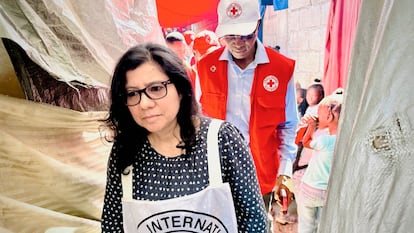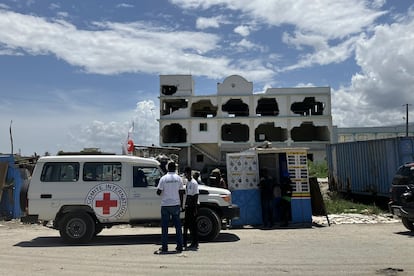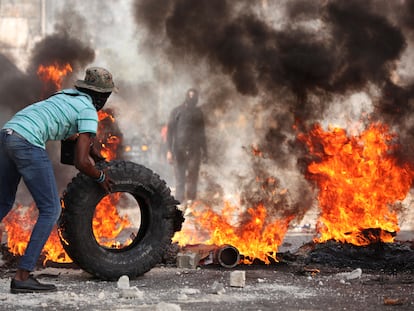Marisela Silva Chau, director of the Red Cross in Haiti: ‘We must prevent a humanitarian collapse. The population is already at its limit’
The head of the ICRC delegation in the Caribbean country warns that health services are on the verge of collapse and that food insecurity is close to famine levels


In a world consumed by the whims and fancies emanating from the White House in Washington, the crisis bleeding Haiti dry, an unprecedented nightmare in the Western Hemisphere, has been relegated to the background. The UN has warned that more than 80% of the capital, Port-au-Prince, is under the control of armed groups, criminal organizations that have taken advantage of the power vacuum to establish a state of terror: there are more than one million displaced people, the death toll has risen to more than 5,000, and human rights abuses are horrific. Amid the violence is the humanitarian crisis. Marisela Silva Chau, head of the International Committee of the Red Cross (ICRC) delegation in the Caribbean country, warns in this interview that health services are on the verge of collapse and that food insecurity has nearly reached famine levels.
Organizations like the Red Cross are trying to provide relief to a population on the brink, but they also face criminal terror: gang members attack these organizations’ convoys and threaten their staff. “Humanitarian organizations currently have an extremely difficult job in Haiti. They are faced with the need to assess countless security risks and adopt mitigation measures to preserve the safety of their teams,” says Silva Chau. While the world is coming to terms with the nervousness of the economic ups and downs of a new world order based on uncertainty, Silva Chau urges everyone to focus on the small Caribbean country that is silently bleeding to death: “We must prevent a humanitarian collapse,” she warns.
Question. The International Red Cross has warned that the renewed fighting is fueling a humanitarian crisis with no end in sight. What is the current situation in the country?
Answer. Indeed, the International Committee of the Red Cross, through its delegation in Port-au-Prince, shares your deep concern about the situation of the Haitian population most affected by armed violence in the country, particularly in the capital. Today, only 40% of health facilities are functioning. For a population of 12 million, access to basic health services is extremely restricted and on the verge of collapse. Between January 2024 and January 2025 alone, the number of internally displaced persons fleeing armed violence increased from 300,000 to more than one million. These people are displaced repeatedly in the face of the proliferation of armed confrontations in various parts of the capital. This exponential increase demonstrates the rapid deterioration of the situation in just one year.
Q. Life in Haiti is becoming increasingly precarious. Clashes between armed groups and government forces have plunged the country into chaos. Hospitals are overwhelmed. How can people access health services now?
A. Certainly, around 3.7 million people, roughly the total population of the capital, Port-au-Prince, currently depend on the few functioning health centers, particularly the Hôpital Universitaire de la Paix, which is the only one capable of providing comprehensive services but is already overburdened by the closure of other hospitals and health centers, given the volatile security situation in the capital. In this regard, health centers such as those run by Doctors Without Borders (MSF) are an additional source of health services. Among other organizations, the ICRC is currently supporting the Hôpital Universitaire de la Paix to ensure it can maintain its capacity to provide care.
Q. There are also problems with the water and food supply. What consequences do you expect for the near future?
A. Like food insecurity, which is close to famine levels as in other regions of the world affected by armed violence, the lack of access to drinking water is also a critical issue for the Haitian population most affected by violence. Water infrastructure has been destroyed as a result of armed violence since 2020, and the trend continues today. This means that a significant number of the Haitian population now depend on water trucks for access to drinking water. The ICRC is currently supporting the national water authority, DINEPA (Direction Nationale de l’Eau Potable et de l’Assainissement), to ensure it can provide drinking water to the population living in the areas most affected by armed violence.

Q. Criminal gangs control 80% of Port-au-Prince. What implications does this have for the work of humanitarian organizations?
A. Humanitarian organizations face an extremely difficult task in Haiti today. They are faced with the need to assess numerous security risks and adopt mitigation measures to preserve the safety of their teams. At the ICRC, our organization strictly manages security. Within the framework of our principles of neutrality and impartiality, we maintain bilateral and confidential communication with all stakeholders, managing the required security guarantees in a transparent manner. These security guarantees are the sine qua non condition for ICRC teams to remain on the ground supporting the Haitian population most affected by armed violence in their access to essential services.
Q. What is the situation like now for International Red Cross staff?
A. The ICRC continues to work in Port-au-Prince. We have a team of expatriates and national staff, totaling around 70 people. We are currently working to promote humanitarian access to essential services such as health care and drinking water for those most affected by armed violence. We are in contact with all authorities and arms bearers to promote respect for the principles of humanity in all circumstances. We are also supporting the Haitian Red Cross and other partners of the International Red Cross and Red Crescent Movement present in Haiti.
Q. Do you have basic security? Do you have government support?
A. The ICRC manages the security of its teams bilaterally and confidentially with all concerned parties. Our activities are known to all authorities and to the bearers of weapons, as appropriate. Our principles (neutrality, impartiality) and working methodology (confidentiality) are known and accepted by all.
Q. What call do you make to the international community?
A. As an impartial, neutral, and independent international organization whose exclusively humanitarian objective in Haiti is to protect and assist the population most affected by armed violence, the ICRC calls on all stakeholders and the international community to deploy all necessary efforts and measures to ensure respect for and protection of the population, medical and humanitarian missions, and to prevent a humanitarian collapse in the country. The Haitian population is already at its limit.
Sign up for our weekly newsletter to get more English-language news coverage from EL PAÍS USA Edition
Tu suscripción se está usando en otro dispositivo
¿Quieres añadir otro usuario a tu suscripción?
Si continúas leyendo en este dispositivo, no se podrá leer en el otro.
FlechaTu suscripción se está usando en otro dispositivo y solo puedes acceder a EL PAÍS desde un dispositivo a la vez.
Si quieres compartir tu cuenta, cambia tu suscripción a la modalidad Premium, así podrás añadir otro usuario. Cada uno accederá con su propia cuenta de email, lo que os permitirá personalizar vuestra experiencia en EL PAÍS.
¿Tienes una suscripción de empresa? Accede aquí para contratar más cuentas.
En el caso de no saber quién está usando tu cuenta, te recomendamos cambiar tu contraseña aquí.
Si decides continuar compartiendo tu cuenta, este mensaje se mostrará en tu dispositivo y en el de la otra persona que está usando tu cuenta de forma indefinida, afectando a tu experiencia de lectura. Puedes consultar aquí los términos y condiciones de la suscripción digital.

